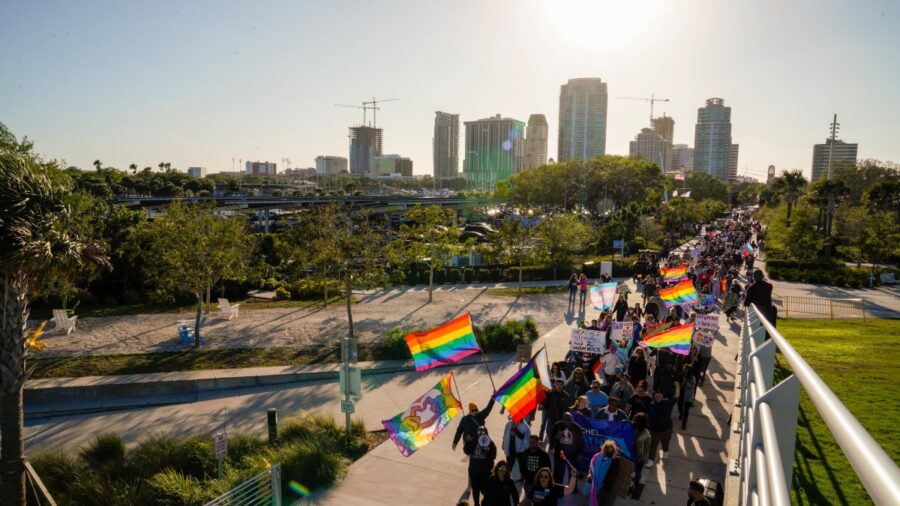
As we celebrate Pride month, 2022 is on track to break records for anti-LGBTQ legislation. More than 300 anti-LGBTQ bills have been introduced in state legislatures, according to the Human Rights Campaign. The legislative tracker compiled by Freedom for All Americans shows that Tennessee alone introduced 31 anti-LGBTQ bills, Iowa 19, Missouri and Arizona 17 each.
What kind of anti-LGBTQ legislation?
Legislative action in various states has focused on school policy and curricula. Some bills have sought to ban instruction and classroom discussion on LGBTQ issues. The most prominent one – the Don’t Say Gay Bill championed by Gov. Ron DeSantis in Florida – has become a model for similar initiatives in more than a dozen states, including Georgia, Alabama, Louisiana and Ohio. Bills in Tennessee and Oklahoma also tried to ban books on LGBTQ issues from schools and libraries. A second group of bills consisted of efforts to ban gender-affirming care for transgender youth. Several states, such as Texas, Alabama and Idaho, have taken a step further, labeling medical care for transgender youth “child abuse” and criminalizing parents and medical providers who offer such care. Almost 20 states have also focused on trans youth sports ban, looking to prevent trans girls and women from playing on girls’ and women’s school sport teams. Other bills used religious exemptions to discriminate against LGBTQ people and prohibited transgender individuals to use bathrooms corresponding to their gender identity.
Why is there a proliferation of anti-LGBTQ bills?
Before 2020, no single state in the country had introduced a bill banning gender-affirming care. How do we explain the exponential increase in the number of anti-LGBTQ bills at a time when support for LGBTQ rights has reached record highs? What we are seeing is the resurgence of political homophobia, which strategically uses LGBTQ rights, and trans rights in particular, as a “wedge issue” for political gains. This elite-led strategy has two main goals. First, anti-LGBTQ bills serve to mobilize the most conservative electorate. Politicians introducing anti-LGBTQ legislation are not speaking to the average American voter who is supportive of LGBTQ rights. They are not even speaking to the average Republican, considering that now a majority of Republicans support same-sex marriage. In fact, anti-LGBTQ elected officials aim to rally the most conservative supporters, who still oppose gay, lesbian and trans rights and who are often crucial to win Republican primaries. Sponsoring these bills allows Republican politicians to present themselves as ‘true Conservatives’ and fend off far-right challengers in primaries. Second, anti-LGBTQ bills have been a successful fundraising strategy for their proponents, who often send donation requests as debate over LGBTQ rights is prominent in the media. These bills also successfully raise resources for conservative groups, who then promote their broader agenda beyond LGBTQ rights, including a recent focus on reproductive rights and critical race theory.
Which strategies have opponents of LGBTQ rights adopted?
Two main aspects stand out in current anti-LGBTQ campaigns: a focus on trans rights and justifications often framed around child protection. The target of trans rights is partly explained by the relatively lower support in public opinion for trans rights, compared to lesbian and gay rights. Americans are split in half when it comes to support for bathroom use consistent with one’s gender identity and gender-affirming care for trans youth. Opposition to trans women playing on women’s sport teams beats support almost 2 to 1. The lower familiarity that American people have with transgender individuals helps account for these numbers, considering that only 3 in 10 Americans have transgender friends or family members. Anti-LGBTQ legislation is then often justified with the need to protect children against groomers and sexual predators. By framing such legislation around child protection, anti-LGBTQ actors present themselves as guardians of morality and put supporters of LGBTQ rights in a tough position – after all, how can anyone be against the welfare of children? This is a long-standing strategy in anti-LGBTQ campaigns, adopted by Anita Bryant’s ‘save our children’ movement in the 1970s and by supporters of 1978 Proposition 6 in California (known as Briggs Initiative) that sought to fire homosexual teachers.
What are the consequences of anti-LGBTQ campaigns?
LGBTQ people in states where these bills are passed into law face the most immediate consequences. Denying health care to transgender children can have serious negative mental health consequences, inasmuch as gender-affirming care is linked to lower depression and lower suicide risk among trans youth. But anti-LGBTQ campaigns have negative effects even when they fail to become law and even for LGBTQ people living in states where no such bills have been introduced. These campaigns stoke resentment against LGBTQ individuals and spur homophobia. They amplify long-lasting negative stereotypes depicting LGBTQ people as pedophiles, groomers and sympathetic to child predators. Stigma then leads to negative mental health consequences for minority groups and increased risk of violence against LGBTQ people.
What can we do to contrast political homophobia and support LGBTQ communities?
To contrast growing political homophobia, the LGBTQ community and its allies must continue to speak up against anti-LGBTQ bills. This is essential to raise awareness among individuals who may be less engaged in politics, and to inform them that their LGBTQ friends and family are under attack. People are more likely to take action against anti-LGBTQ campaigns when they realize their children, siblings, and friends are the ones facing discrimination. Voters also need to turn out and support pro-equality candidates for local and state offices, where many of these bills are introduced. Residents of more liberal states not facing anti-LGBTQ bills should provide support to LGBTQ groups fighting homophobia on the ground through donations, vocal support on social media, and expression of their opposition in communication to elected officials. Private companies who present themselves as supporters of LGBTQ rights should also play a crucial role. The private sector can be a powerful ally in the fight for equality, but only as long as it is willing to take sometimes economically painful measures. Unfortunately, companies often engage in pinkwashing, combining rhetorical embrace of LGBTQ rights with support for anti-LGBTQ politicians. Workers and consumers have the power to put economic pressure on private companies and induce them take a pro-equality stance, such as in the case of Disney and the Don’t Say Gay Bill in Florida. Companies should be pushed to end donations to anti-LGBTQ candidates and elected officials. Companies could go even further and pause economic projects in states passing anti-LGBTQ legislation. This strategy was ultimately successful in defeating the so-called bathroom bill in North Carolina a few years ago.
DEI Buzz
- The mission of the Lesbian, Gay, Bisexual, Transgender, and Queer (LGBTQ) Faculty and Staff Network is to enhance the campus climate of Loyola Marymount University (LMU) by promoting social justice, providing education, and fostering community among the lesbian, gay, bisexual, transgender, queer, intersex, asexual, and other gender and sexual minority (LGBTQIA+) faculty and staff and allies on the LMU campus. Subscribe here.
- Explore the LGBTQIA+ Pride month hub for events, Zoom backgrounds, and ways to get involved at LMU.




